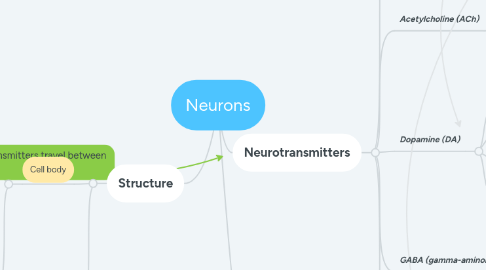
1. Structure
1.1. Cell body
1.1.1. Axon
1.1.1.1. Dendrites
1.1.1.1.1. Synapse
1.1.1.1.2. receives messages
1.1.1.1.3. branch-like structure extended from cell body
1.1.1.2. away from the cell body
1.1.1.3. connected to other neurons, muscle cells, or cells in another organ
1.1.1.4. Sheath surrounds axon and helps signals travel faster and farther
1.1.1.5. Vary longer or short
1.1.2. Contains nucleus
1.2. Neuron surrounded by support cells
2. Neurotransmitters
2.1. Norepinephrine (NE)
2.1.1. acts as both hormone and neurotransmitter
2.1.2. helps speed reaction time
2.1.3. increases alertness and arousal
2.1.4. works with dopamine to help focus
2.1.4.1. low levels can negatively affect attention and concentration
2.1.4.1.1. can lead to ADHD
2.1.4.2. Medication like Ritalin or Adderral can raise and/or maintain NE and DA
2.1.5. works with serotonin to affect mood
2.1.5.1. low levels can lead to depression
2.1.5.2. medications like Cymbalta, Effexor, triciclic antidepressants) can raise
2.2. Acetylcholine (ACh)
2.2.1. excitation neurotransmitter
2.2.1.1. makes cells more excitable
2.2.2. muscle contractions
2.2.3. causes glands to secrete hormones
2.2.4. shortage associated with poor memory formation
2.3. Dopamine (DA)
2.3.1. inhibitory
2.3.2. affects mood and complex movements
2.3.3. shortage results in muscle rigidity
2.3.4. many medications target to treat behavioral disorders
2.4. GABA (gamma-aminobutyric acid)
2.4.1. inhibitory
2.4.1.1. makes cells less excitable
2.4.2. helps control muscle activity
2.4.3. important for visual system
2.4.4. increase of GABA used to treat epileptic seizures and tremors
2.5. Serotonin (5-HT)
2.5.1. constricts blood vessels, brings on sleep, temperature regulation
2.5.2. Selective Serotonin Reuptake Inhibitors (SSRI) medications
2.5.2.1. hinder reabsortpion process
2.5.3. some research suggests increase improves mood
2.5.4. too much can overstimulate central nervous system
2.5.4.1. serotonin syndrome
2.5.4.1.1. potentially life threatening
2.5.4.1.2. symptoms include agitation, confusion, diarrhea, headaches, increase hear rate and blood pressure, loss of muscle coordination and others
2.5.5. men and women react differently
2.5.5.1. reduced level in men lead to impulsivity while women developed poorer mood and increased caution

